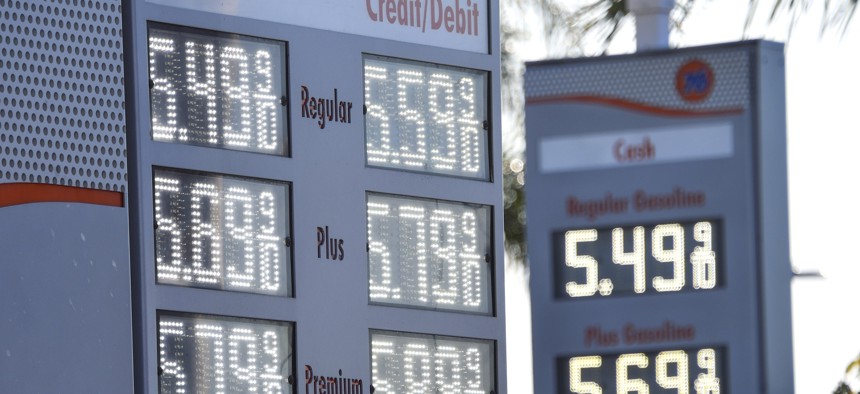6 Democratic Governors Push For Federal Gas Tax Holiday

High gas prices at stations on the corner of Beach Boulevard and Lampson Avenue in Stanton, CA, on Monday, March 7, 2022. Jeff Gritchen/MediaNews Group/Orange County Register via Getty Images
They’re backing legislation in Congress that would pause the tax until 2023. Gas prices are expected to climb higher as the U.S. cuts off Russian oil imports.
This story has been updated.
Six Democratic governors on Tuesday called for the suspension of the federal gasoline tax of 18.4 cents a gallon, in response to escalating prices nationwide.
The governors of Colorado, Michigan, Minnesota, New Mexico, Pennsylvania and Wisconsin signed a letter supporting a proposal before Congress to stop collecting the tax until 2023. The legislation, they said, “would alleviate the consumer cost of rising gas prices while protecting the federal government’s capacity to make infrastructure investments.”
The legislation has been introduced in both the House and Senate but has not moved. It would allow the U.S. Treasury to make up for the lost tax payments to the Highway Trust Fund, which accounts for the bulk of federal surface transportation spending, with transfers from the general fund.
The Highway Trust Fund was designed to be self-sufficient with payments from gasoline and diesel taxes, but Congress has topped off the account with general funds numerous times since 2008 to keep paying for roads and transit without raising federal fuel taxes. Congress has not changed the current tax rates of 18.4 cents per gallon for gasoline or 24.4 cents for diesel since 1993.
The governors weighed in on the federal measures, as Democrats scramble for ways to respond to rapidly rising gas prices. The oil industry struggled to boost production after laying off thousands of workers early in the pandemic, but recent events in Ukraine have sparked even more increases.
President Biden announced Tuesday that the United States would stop importing oil and gas from Russia, in retaliation for Russia’s invasion of Ukraine. That sent prices soaring even further.
“Average gas price per gallon in Wisconsin is almost $4 after going up more than 50 cents in a week,” Wisconsin Gov. Tony Evers said on Twitter. “Wisconsinites can’t wait.”
The governors’ letter said the legislation “saves Americans at the pump” with lower prices.
“Money saved at the pump translates into dollars back in consumers’ pockets for groceries, child care, rent and more,” they asserted.
But experts warn that consumers might not see that much of a windfall from gas tax breaks, and it might not last.
“It’s not like you’re going to wake up tomorrow and stations are going to lower their prices by 18.4 cents. … There’s a risk to cutting gas taxes that you’re relying on stations to pass along the decrease, but it’s really up to them,” Patrick De Haan, the head of petroleum analysis for GasBuddy, a fuel-price tracking service, told Route Fifty last month.
But the idea of rolling back gas taxes has become politically popular at both the state and federal level this year, given the climbing fuel prices.
Colorado Gov. Jared Polis, one of the signatories of the Tuesday letter, supported rollbacks at both levels. The governors of Arkansas, California, Florida, Illinois and Virginia have floated the idea at the state level, as have many state legislators and candidates.
Evers, the Wisconsin governor, and Michigan Gov. Gretchen Whitmer are considered some of the most vulnerable Democratic incumbents in this year’s wave of gubernatorial elections. Pennsylvania Gov. Tom Wolf, who also signed the letter, is term-limited, but his seat is also expected to be one of the marquee gubernatorial races in the fall. The Cook Political Report says the seats of Minnesota Gov. Tim Walz and New Mexico Gov. Michelle Lujan Grisham, the other signatories who are running for re-election, will “likely” remain in Democratic hands.
Daniel C. Vock is a senior reporter at Route Fifty and is based in Washington, D.C.
NEXT STORY: Modern Building Codes Slash Energy Costs, Boost Resiliency






